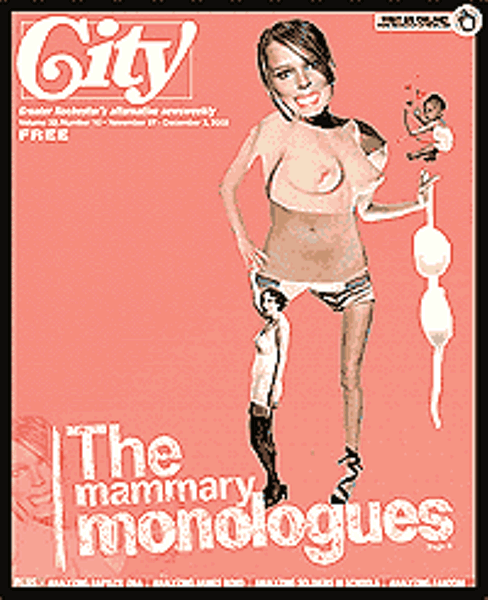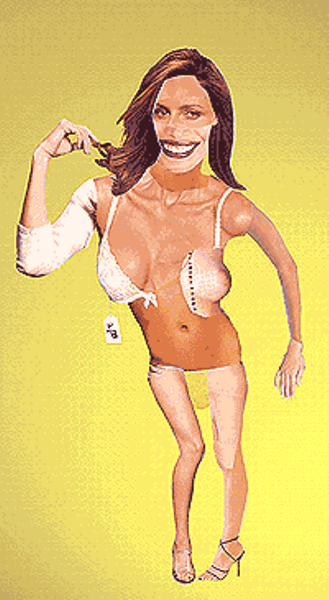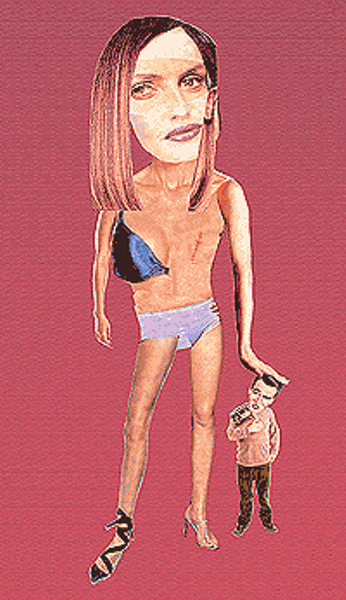As a topic, breasts are a handful.
But seriously, breasts receive more attention than any other body part. They've been sexualized, politicized, exploited, and covered up --- everything but ignored.
I'm tired of seeing breasts presented in pop culture as sex objects all the time. For those of us who live with them on a day-to-day basis, breasts are more mundane and complex than that. We shove them into bras, check them for lumps, wish they were bigger or smaller, and yes, we also have fun with them.
What is it like to be the proud owner of a rack? Or to be just developing one? Or to have lost your boobs to cancer and the surgeon's knife? What happens after pregnancy and nursing to those once-pert breasts? Do you augment? And what about growing old --- how can aging affect the way we view our bodies?
It wasn't hard to draw people out on the topic. Every woman's got at least one breast story. Even Rochester has a breast story --- a decade ago the Topfree 7 won a big court battle here making being topless legal for women in New York State.
If you're looking to get titillated, run along. There are pages at the back of this rag for that kind of fun. If you want to eavesdrop on women talking about how they feel about their breasts as time passes and their bodies change, read on.
In sixth grade, I noticed two little buds had appeared under my striped t-shirts. What was going on? My body, which I thought I knew so well, was changing. It was betraying me. I had always biked faster, climbed higher, and talked tougher than the boys. Now they had something on me: I was a girl.
"They were hard. Small and hard," Tina, 35, says. "My mother prepared me for getting my period but she never said anything about breasts... I would come home and rip my training bra off. It was just miserable. You felt like you had to wear it, because you had these growths."
"I don't really have a cup size," says 13-year-old Katherine. "I wear a sports bra and the camis with the shelf. One of my really good friends is a B cup. It doesn't really matter to me. For a while she taped them because she didn't want anyone to see them... If there are no teachers in the hall, the really rude boys might say something crude about your breasts."
"I had a client who had a lot of friends who were boys," says licensed psychologist Amber Keshishian, Ph.D., whose practice is devoted to children. "When her breasts developed, suddenly the boys started commenting on them. And she has big boobs. She was no longer one of the guys. She's gone through a transition in the past couple of years. Most of her friends are girls now.
"If it doesn't do something to the girl, it does something to the boys. And that makes the girls change their behavior."
I never tried to emulate Barbie, but as a young teenager I worried that I wouldn't be curvy and beautiful like the women in magazines and on television. Now, decades after Helen Reddy's I am Woman (Hear me Roar) hit the charts and the movie Nine to Five glamorized the fight for equality in the workplace, pop culture still sends mixed messages to girls.
"I read Cosmo Girl and other teen magazines," Katherine says. "Sometimes some of the ads where the shirts are really low and stuff are kind of weird. All the editors of the magazines are women, so it's not that bad, but there is a lot of pushing girls to be the prettiest."
"Culture has ambivalent images for young women about body image," Judith Smetana, Ph.D., professor of psychology at the University of Rochester says. "Models are super thin with no hips and not much breasts. There are no role models." How girls feel about their bodies in puberty is determined, she says, by how their mothers prepare them. "If they talk about it in a negative way, the girls can get negative expectations."
When I was 14, my friend's mother took us and another girl on a tour of Europe. In the museums and churches we saw paintings and sculptures of naked women --- Mary nursing the baby Jesus, plump beauties draped on divans, triumphant marble goddesses. I'd never seen the female form represented in so many ways that were neither commercial nor pornographic.
On a warm day in the foothills of the Alps, the four of us took off our shirts. We hadn't seen a soul for hours. We walked through fields of wildflowers surrounded by snow-covered mountains. The sun on my breasts felt good. It seemed unfair that men can have this feeling all the time and women can't.
This past summer, Julia Goforth was in Rochester shopping and swimming topless. She is the vice president of the Topfree Equal Rights Association (TERA) and was here with documentary filmmaker Genevieve Colvin (Seven Years In Tibet), who is making a film about America's obsession with breasts.
"When we went to the [Genesee Valley Park] swimming pool, at first all the children got out of the pool and pointed," Goforth says from her Toronto home. "Then it died down, and the kids asked, 'Why aren't you wearing a shirt?' I was able to compare it to the racial situation in the '50s. Back then, they would have had to swim in a different pool because their skin was a different color. I told them it's not fair that I have to wear a shirt just because I was born a female. The kids understood that.
"I don't get negative comments from men. But women have been really negative. The prettier they are and the more fit they are, the more negative they've been. Especially if they've had boob jobs. I understand it. Seeing me [topfree] makes them question their own belief systems and what they think about their bodies."
Desmond Morris, the zoologist, posited an amusing theory that human breasts evolved to be full after we started walking upright, replacing the bum as a focal point for sexual attraction. In hot and heavy encounters, breasts are usually the gateway to the rest of the body --- strippers start at the top; sex scenes in movies generally involve lots of boobage first. When young kids first grope each other, second base acts as a kind of border patrol, a passport checkpoint between just making out and serious fooling around.
"The first boy who saw my breasts became obsessed with them," says Anna, age 40. "We were 13. He said they should be the prototype for all breasts. Whatever. Then we broke up and he'd call once in a while to say that mine were still the best.
"When he went to college his major was women's studies --- he thought he was so enlightened, but he kept talking about my breasts! It went on and on through law school, until one day, when we were both engaged to other people, I said, 'I'll let you see them if you'll just shut up!' He decided not to. I think he wanted to keep that perfect memory. But at least he stopped calling."
"It's nice to walk in The Mirage with the girls," Kristy says. "We know all the girls. There's the sexy girl doing the pole dance and she'll stop and wave or stick out her tongue at us. They know we're lesbians. [The strippers] like to dance for the women. They will go around to all the ladies first, before they go to the men in the audience.
"Our favorite stripper doesn't have implants. She has these teeny breasts. She can dance and crawl and she's pretty limber. She looks great."
When you enter the pregnancy and breastfeeding phase, your boobs become everyone's focal point. First of all, they generally get larger. Strangers notice them, your partner wants to touch them more, your baby wants to spend her whole life attached to them.
Ironically, at this moment of complete embodiment --- of using your body to grow and feed babies --- people treat you as if you are disembodied. Strangers touch your belly. They comment freely on your size, shape, and diet. They act strangely when you nurse.
"Before I got involved in TERA [Topfree Equal Rights Association], I had been told to leave the YMCA to breastfeed my child," Julia Goforth says. "The ironic thing is, the next month the YMCA in Toronto hosted the international breastfeeding conference. At the time, I had a terrible body image. I thought I was fat and I didn't like my body. So when I breastfed, I was careful not to let even a small part of my breast show. And I was incensed by that --- how dare you tell me where and when I can feed my child?"
As tricky as nursing can be in public, the problems posed by pumping can be much more difficult. Pumping at work is hard because often there are no private places. Women on the go make do by pumping in the bathroom, a conference room, anywhere they can.
"I borrowed a little hand pump to use on the plane to Italy," says Bridget, mother of then-11-month-old Annie, who was still nursing. She had to leave her daughter for a few days and wanted to keep her milk supply up by pumping and dumping.
"It was a little funnel and manual lever," she says. "You screw the bottle onto the bottom. I probably should have tried it before I left. On the flight over, the lights go down, the flight attendants sit down, the movie comes on, people start to sleep. It was the perfect time.
"I pull my blanket up thinking, 'I can do this!' Once my blanket is up, I can't see what I'm doing. I'm in the middle seat in the middle row --- I can hardly move. I'm reaching under the blanket and trying to attach the pump. I'm soaking wet. There's milk everywhere.
"Later, when my shirt was dry, I went into the bathroom to pump."
After we have kids, we are often dismayed by the sad, sorry state of our breasts. Some women just don't like their breasts. So, the topic of enhancement often comes up. Typically, women don't fess up to wanting bigger breasts to attract others; they say they want their breasts to be in proportion or they want to restore some of their youthful pertness. But the stakes are high enough to scare some people off.
"My philosophy is I want to be a mom, but I don't want to look like one," says Mary, mother of three. "I have a young attitude. I work out. I have cleavage from weightlifting. I wear a bra with silicone inserts to make my body look more proportional."
Mary met with a surgeon to discuss implants and decided against it. "She talked me out of it. She said it's not permanent. They only last between two and 10 years. It wasn't the $7,000; it was the risks of anesthesia and repeated surgery.
"Most women get bigger from nursing. Lucky me, I was smaller. My nipples droop to the ground. My husband couldn't care less. He likes that I'm slender and fit and he thinks I'm hot. We have relations one, two, three times a day. What the hell do I need breasts for?"
"When I was in high school, I'd put Kleenex in my bra," Ginny, 58, says. "I was small on top and my clothes didn't fit right... Then, I was pregnant four times and nursing for years. I had big breasts for six years. I loved it. After that, I had to deal with these empty envelopes that had been sucked on. My husband said he didn't care. If I was going to get implants it was something I was going to do for me, not anything about him.
"I went to a large size B or small C cup. It's been 10 years. The scars are practically invisible. I heal beautifully. There's a small scar under each breast. People who see me naked don't say, 'That's an implant.'
"I do enjoy flaunting --- not flashing --- my breasts when I wear a low-cut blouse."
Three weeks before my wedding, my gynecologist told me I had breast cancer. She was doing a routine breast exam and felt a lump. I realized later how irresponsible it was for her to make a diagnosis based on palpation alone. But at the time, I fell down a rabbit hole of terror and tests and trips to the doctor.
As time passed, it appeared that I might have to have a biopsy. I called the woman who was making the wedding dress I designed and told her to raise the plunging neckline by an inch. I wanted to be brave. I told myself that even if I had a mastectomy, I would go ahead with my plan to sunbath nude on the little Mediterranean island we'd chosen for our honeymoon.
Three days before our wedding, we found out I did not have cancer. In the chaos beforehand I had forgotten to buy shoes, but I didn't care. I walked down the aisle in my parents' backyard barefoot and elated.
"I was diagnosed three years ago with breast cancer. I was 27. I had a bilateral mastectomy," Christie says. She chose a two-phase reconstruction process that involved expanding the tissue between her ribcage and her pectoral muscles and then inserting the implant. "My husband and I had a disagreement about what size to be. He wanted Dolly Parton all the way!
"I've got the toughest boobs because they're under my pects. They look fantastic but they are hard as rocks. I never ever wear a bra, unless it's a see-through shirt. I'll be 90 and I'll have perky boobs.
"My husband and I laugh just as much as we did before. He made me feel so beautiful and he reminded me that they're just boobs, they're just boobs. I've shown more people my boobs. It's kind of, 'Come to Christie's house, you can see her boobs.'
"The biggest thing that bugs me is that underneath there's a scar that goes up fairly high. I can't wear tank tops because you can really see the scar."
In our teens and childbearing years, breasts seem like they're always in a new phase, taking on new functions or forms. But when we get older, our breasts hit a plateau. After menopause, as estrogen levels vary, some women experience breast tissue and elasticity loss. It can be a challenge to face these changes and still maintain a healthy sense of self.
"Issues of body changes with aging seem to focus mostly on the loss of function, as well as the loss of the sense of being attractive," says Dr. Katherine Duffy, medical director for the Older Adult Service at Strong Behavioral Health. "It starts with menopause. The people who don't age gracefully have an internal image or sense of themselves that stops, that doesn't mature along with them. Your body's response and your perception don't match --- you can't move as fast, you don't look the same as you used to."
"I had five children," says Betty, a grandmother. "You nursed your babies because that's how our parents were brought up. As you get older, they get saggy if you nurse your babies. My breasts are so saggy now. The bristle --- that's what I call it --- the bristle that holds them up is gone. Your body is not as beautiful as it used to be.
"That's the way Jehovah made us --- he gave us a beautiful body when we're born. Then it changes. But you are still beautiful; you just get slack, that's all. Your breasts get soft. Don't stop loving yourself. Just put on a panty girdle. It will help you with your shape."
"I'll remember all my life how beautiful my grandmother was," says Vicki, 54. "She had two mastectomies and I would see her take off her bra with the prosthesis in it.
"Yes, she was wrinkly, but she was beautiful to me. She wasn't young. She wasn't firm. She wasn't thin. She didn't have breasts. She wasn't any of the things you were supposed to be. And she was not self-conscious.
"My mother was diagnosed with breast cancer when she was 40 and she had a double mastectomy. She took a totally different route. She had reconstructive surgery. She loves her breasts now! They're bigger than they were before she had cancer.
"If I had to make the decision, I'd probably do what my mother did. But I'm not sure."


